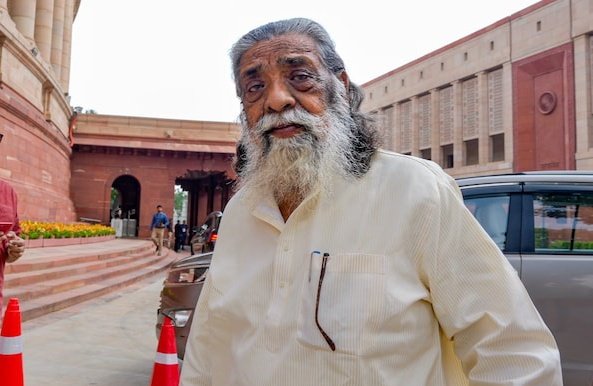Shibu Soren Passes Away at 81: A Life of Struggle, Identity, and Leadership
New Delhi: Veteran politician and tribal icon Shibu Soren, the founding president of the Jharkhand Mukti Morcha (JMM), passed away today at the age of 81 at Sir Ganga Ram Hospital in Delhi. He had been undergoing treatment for kidney-related complications since late June. The news was confirmed by his son and current Jharkhand Chief Minister Hemant Soren, who expressed profound grief, saying, “Respected Guru Dishom has left us all. Today, I feel empty.”
Early Life and Grassroots Activism
Born on January 11, 1944, in Nemra village near Ramgarh (then in Bihar, now in Jharkhand), Shibu Soren belonged to the Santhal tribal community. His early life was marked by tragedy—his father was killed by moneylenders, a turning point that shaped his anti-exploitation activism. He left school to dedicate himself to protecting tribal rights, forming the Santhal Navyuvak Sangh at the age of 18.
He gained grassroots recognition in the 1970s during the “Dhan Katni Andolan,” an agitation against landlords who illegally took crops from tribal farmers. His community honored him with the title “Dishom Guru”—meaning tribal teacher and guide.
The Birth of Jharkhand Mukti Morcha
In 1972, Soren co-founded the Jharkhand Mukti Morcha (JMM) alongside A.K. Roy and Binod Bihari Mahato. The party became a voice for the demand of a separate state for tribal populations in southern Bihar. By 1987, he rose to become the JMM president, leading it for decades through political turmoil and shifting alliances.
Political Career: MP, Union Minister, and Chief Minister
Shibu Soren was elected to the Lok Sabha multiple times from the Dumka constituency in Jharkhand, beginning in 1980. He was also a Rajya Sabha MP and served as the Union Minister for Coal and Mines in the UPA-I government in 2004 under Prime Minister Manmohan Singh. His tenure was temporarily disrupted by legal proceedings related to the 1975 Chirudih massacre case, but he later returned to the cabinet after securing bail.
He was appointed Chief Minister of Jharkhand on three occasions:
- March 2005 – only for 10 days
- August 2008 to January 2009
- December 2009 to May 2010
Despite short tenures, his leadership solidified JMM’s role in state politics and tribal representation.
Legal Troubles and Acquittals
Shibu Soren’s political journey was marred by legal challenges. Apart from the Chirudih case, he was also charged in the murder of his private secretary, Shashi Nath Jha, but was acquitted in 2007. These incidents forced him to resign from office on more than one occasion. Nevertheless, his reputation remained intact among his grassroots supporters, who saw him as a victim of political targeting.
Legacy and Influence
Revered as the father of the Jharkhand movement, Shibu Soren’s legacy goes beyond politics. He symbolized the aspirations of tribal India and gave voice to centuries of marginalization. His contributions played a central role in the creation of Jharkhand as a separate state in 2000.
Until April 2025, he continued as the JMM president, passing the baton formally to his son Hemant Soren. At the time of his death, he was serving as a Rajya Sabha MP.
National Mourning and Tributes
Tributes have poured in from across the political spectrum. Prime Minister, Union Ministers, and leaders from various parties have acknowledged his immense contributions to tribal rights and regional identity. Jharkhand has declared a state mourning period of three days, with the national flag flying at half-mast in all state government offices.
Final Journey
The mortal remains of Shibu Soren will be flown to Ranchi, where the last rites will be conducted with full state honors. Thousands are expected to gather to bid farewell to the leader who changed the face of tribal politics in India.





